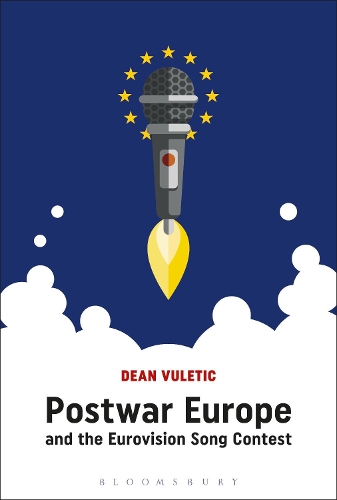
Postwar Europe and the Eurovision Song Contest
(Paperback)
Available Formats
Publishing Details
Postwar Europe and the Eurovision Song Contest
By (Author) Dr Dean Vuletic
Bloomsbury Publishing PLC
Bloomsbury Academic
25th July 2019
United Kingdom
Classifications
Tertiary Education
Non Fiction
General and world history
Popular music
History and Archaeology
European history
782.421640794
Physical Properties
Paperback
288
Width 154mm, Height 232mm, Spine 18mm
440g
Description
Postwar Europe and the Eurovision Song Contest examines how the Eurovision Song Contest has reflected and become intertwined with the history of postwar Europe from a political perspective. Established in 1956, the Eurovision Song Contest is the worlds largest popular music event and one of the most popular television programmes in Europe, currently attracting a global audience of around 200 million people. Eurovision is often mocked as cultural kitsch because of its over-the-top performances and frivolous song lyrics. Yet there is no cultural medium that connects Europeans more than popular music, the development of which has always been tied to cultural, economic, political, social and technological change making Eurovision the ideal tool to explain the history of Europe in the last sixty years. This book uses Eurovision as a vehicle to address topics ranging from the Cold War, liberal democracy and communism to nationalism, European integration, economic prosperity and human rights. It analyses these subjects through their cultural, political and social relationships with Eurovision entries as expressed through lyrics and music, as well as by examining public debates that have accompanied the selection of the entries and the organisation of the contest itself. Postwar Europe and the Eurovision Song Contest also considers how states have used Eurovision to define their identities in a European context, be it to assert their national distinctiveness, highlight political issues or affirm their Europeanism or Euroscepticism in the context of European integration. Based on original sources, including hitherto unpublished archival documents from international broadcasting organisations, this is a novel historical study of interest to anyone keen to know more about the postwar history of Europe and its cultural history in particular.
Reviews
Moves between the Eurovision stage to the political stage Never has it been placed in its international context as in this truly inventive new book. * EuropeNow *
Vuletic goes beneath the bubblegum to reveal surprising machinations. * Foreign Affairs *
As a scholarly study in international cooperation and competition, this book is exemplary. * Times Higher Education *
Dean Vuletics book is an important intervention ... Comprehensive in its coverage, it will become a go-to book for any scholar who is interested in the song contest and its history. * H-Soz-Kult *
It is the recognition of such value in songno less in Eurovision songthat makes Dean Vuletics rich history of the Eurovision Song Contest very important reading indeed. * German Studies Review *
Vuletic ascribes the Eurovision Song Contest an important role in the history of post-war Europe ... Comprehensive in its coverage, it will become a go-to book for any scholar who is interested in the song contest and its history. * H-Net *
The book presents a well-researched and exhaustive historical account of organisational and political matters in relation to the Eurovision Song contest, as well as an in-depth analysis of its cultural significance in a European perspective ... The book as a whole constitutes a significant and valuable contribution to the understanding the interplay of popular music, media and cultural policy in post-World War II Europe. * Popular Music *
[A] survey of the ESC, and a well-researched one. Vuletic makes extensive use of archival materials of the Council of Europe, International Telecommunications Union, EBU and OIRT [An] important and essential book. * Music Reference Services Quarterly *
A fascinating insight into the history of Eurovision. It is accessibly written, draws on a wealth of archival material, and adds much to our understanding of European culture in the postwar period. * Robert James, Senior Lecturer in History, University of Portsmouth, UK *
This is a terrific addition to the literature on music and international relations. Analyzing the history of what has become the biggest forum of collective voting in Europe, Dean Vuletic shows the janus-headed nature of the Eurovision Song Contest a competition both apolitical and political at the same time. A must-read addition for students of musicology, international relations and history, and, really, anyone trying to understand the confusing attraction of Europes largest music show. * Jessica Gienow-Hecht, Chair of the Department of History, John F. Kennedy Institute for North American Studies, Freie Universitt Berlin, Germany *
Overturning familiar assumptions about this "apolitical" celebration of pan-European values, Vuletic brings us a much-needed serious and thorough historical account of the Eurovision Song Contest from its founding in the mid-1950s to the present-day paradox of this "international event with national limitations". A crucial read for anyone interested in the song contest's deeper history and significance. * Ivan Raykoff, Associate Professor of Music, The New School, USA *
Author Bio
Dean Vuletic is a historian of contemporary Europe. As a Lise Meitner Fellow in the Department of East European History at the University of Vienna, he leads the project Intervision: Popular Music and Politics in Eastern Europe. As a Marie Sklodowska-Curie Fellow, he previously led the project Eurovision: A History of Europe through Popular Music. He holds a doctorate in history from Columbia University, USA. He regularly comments on the Eurovision Song Contest in the international media.
